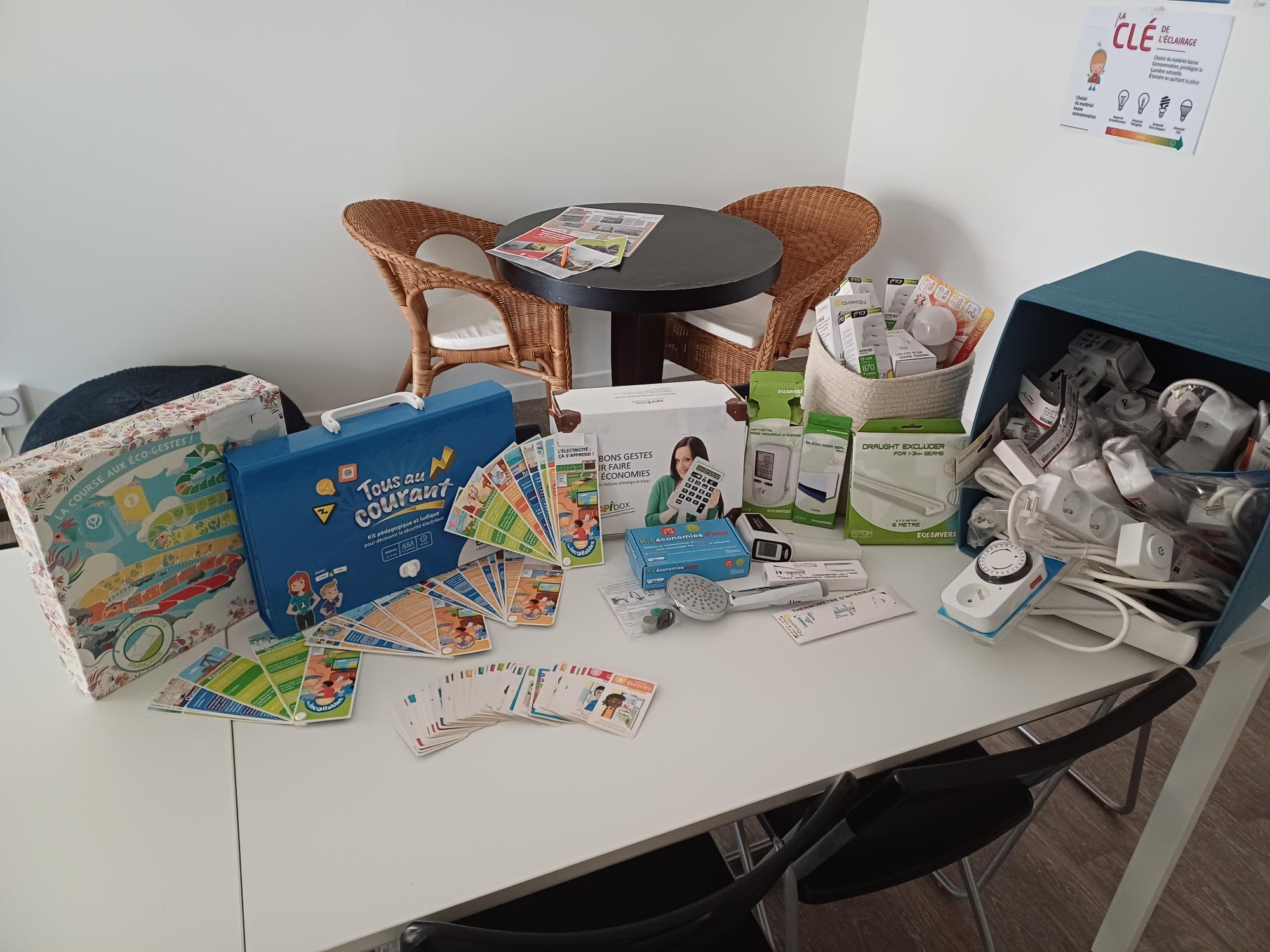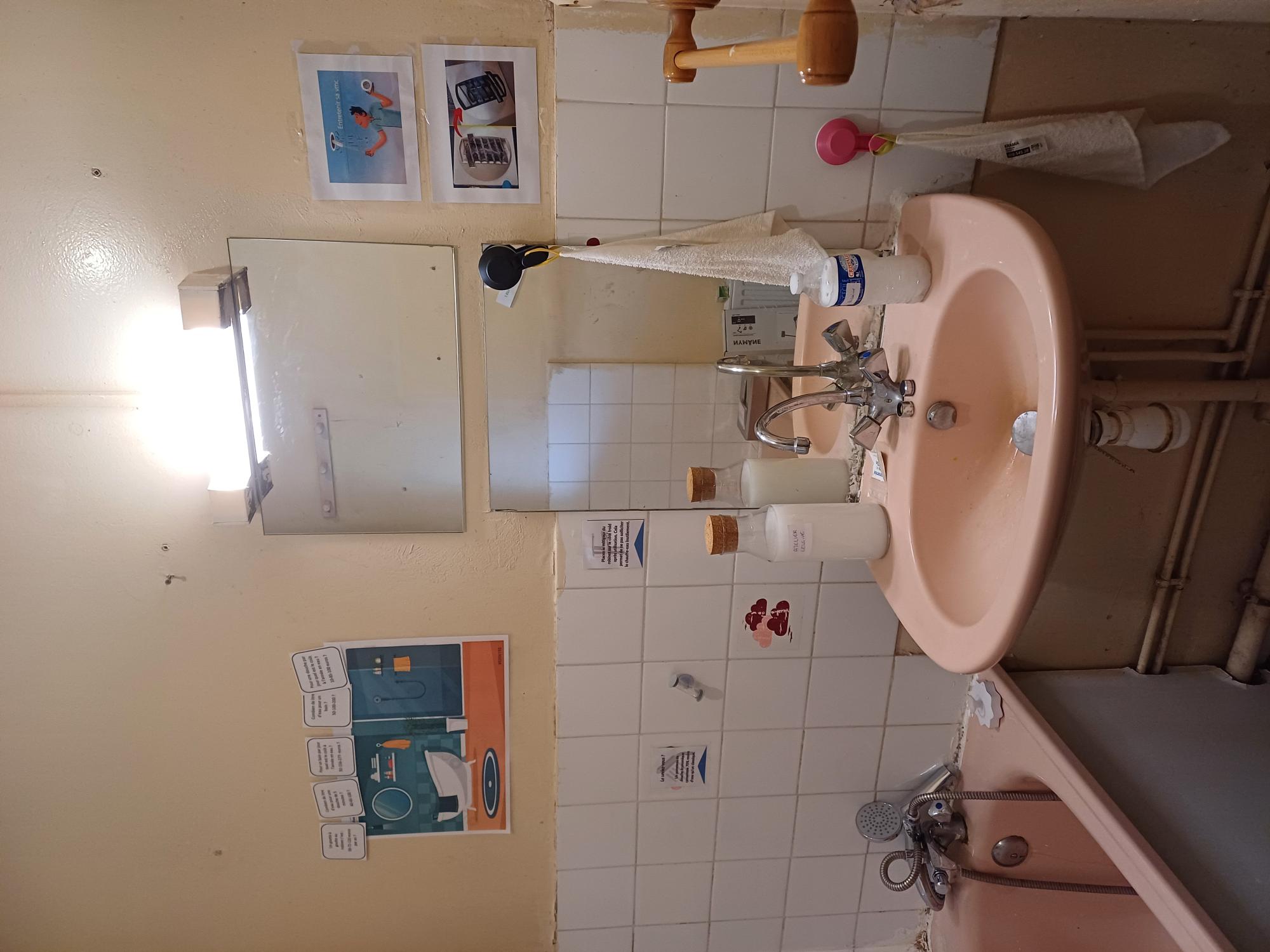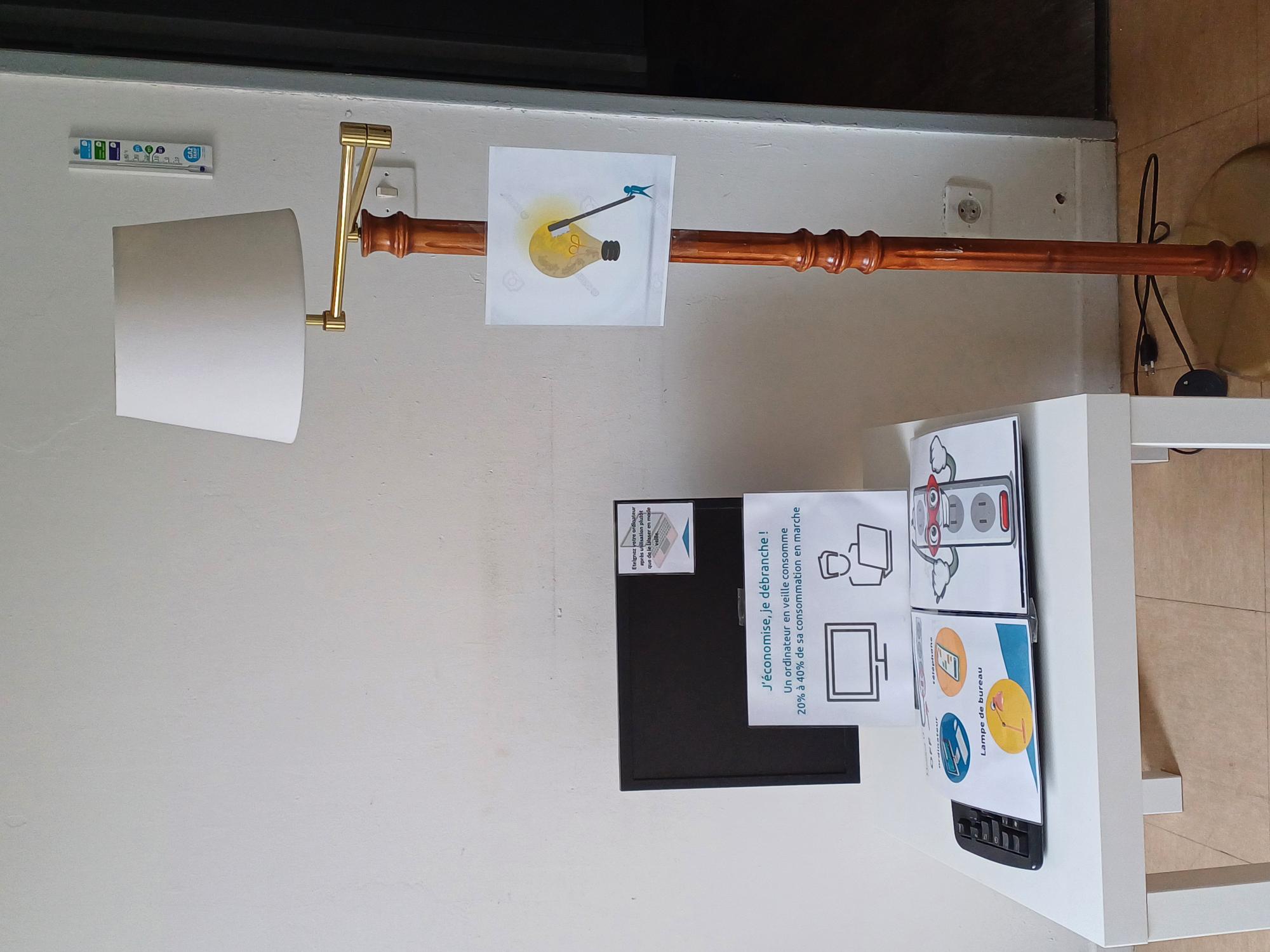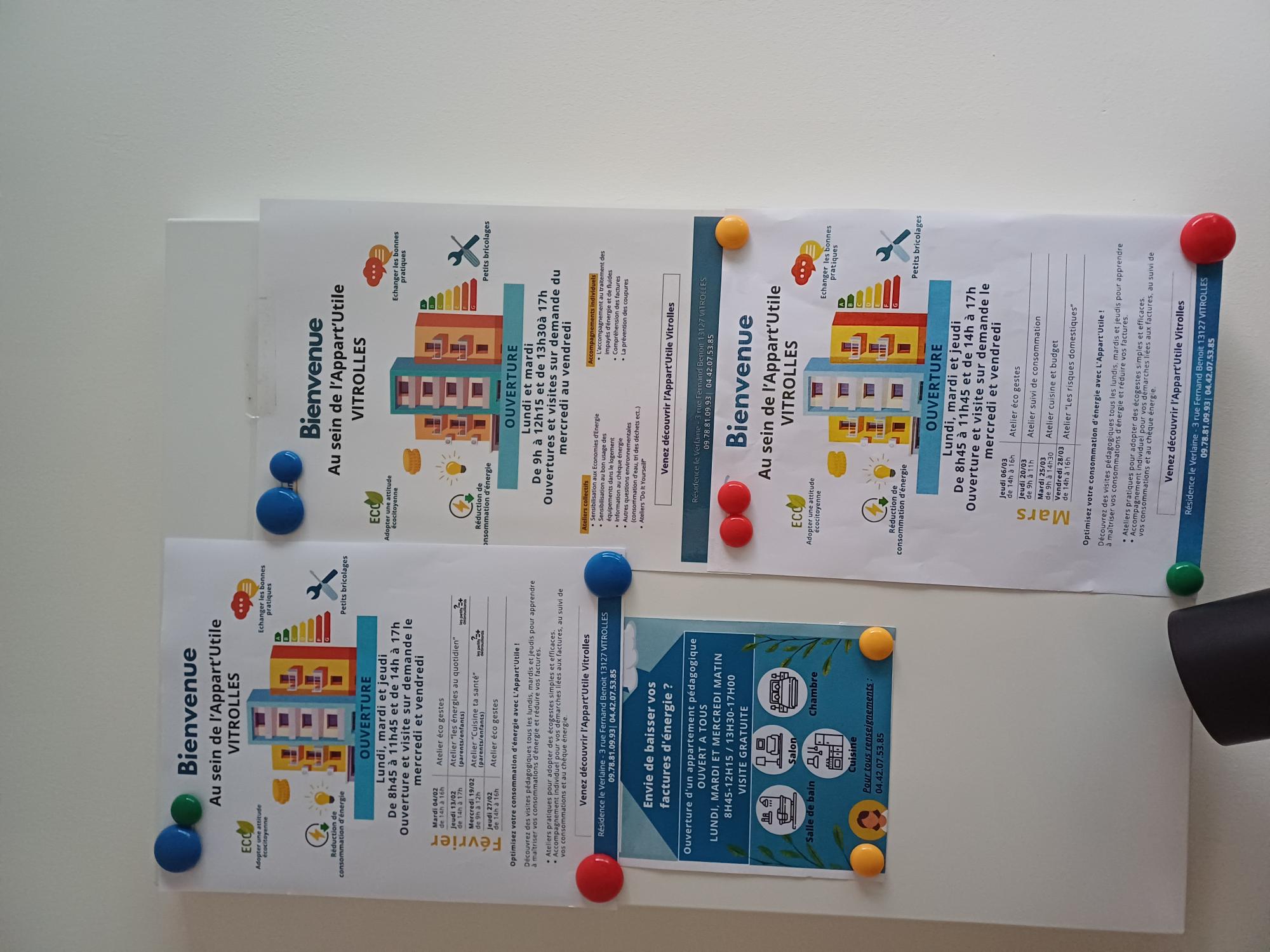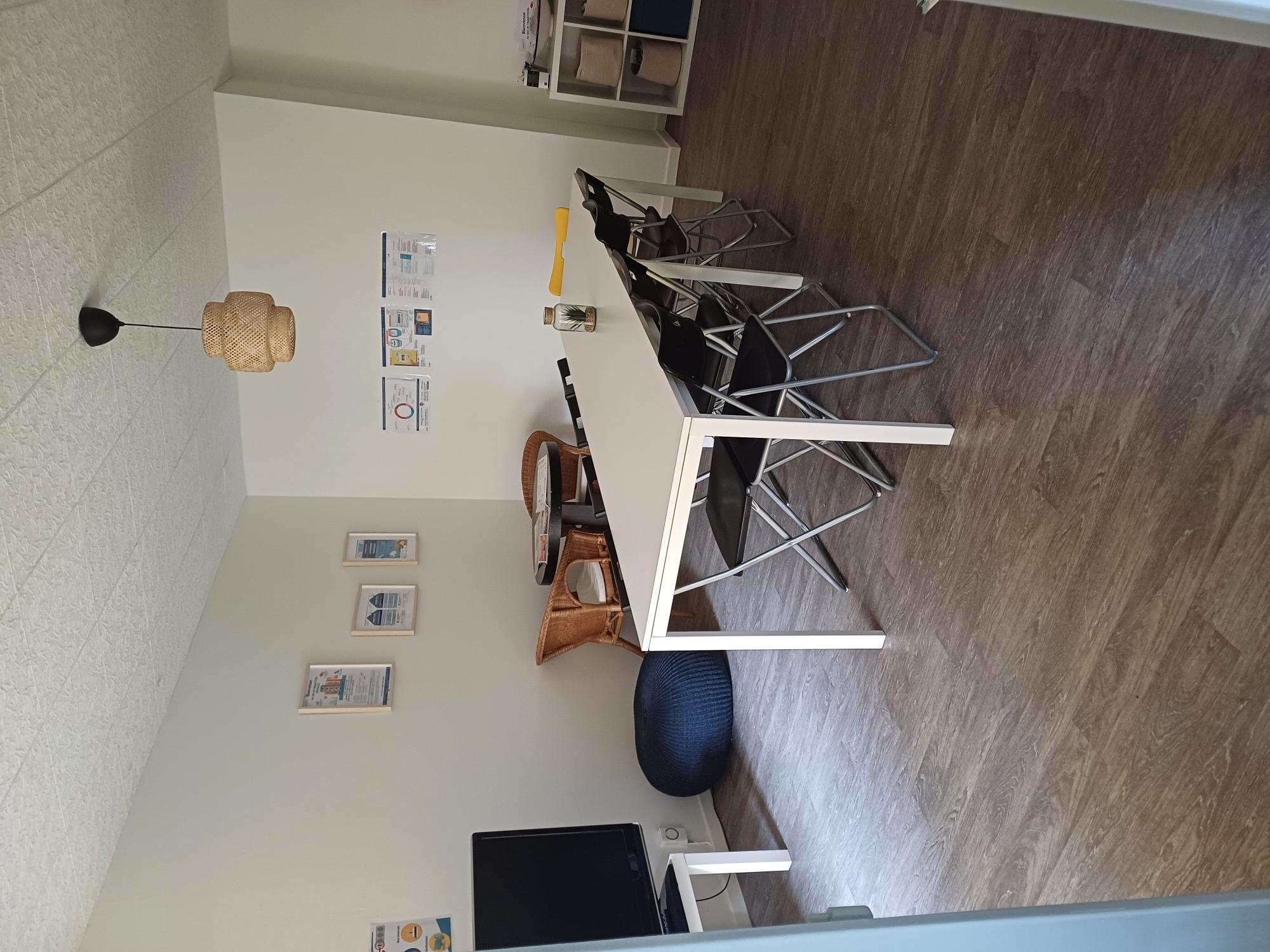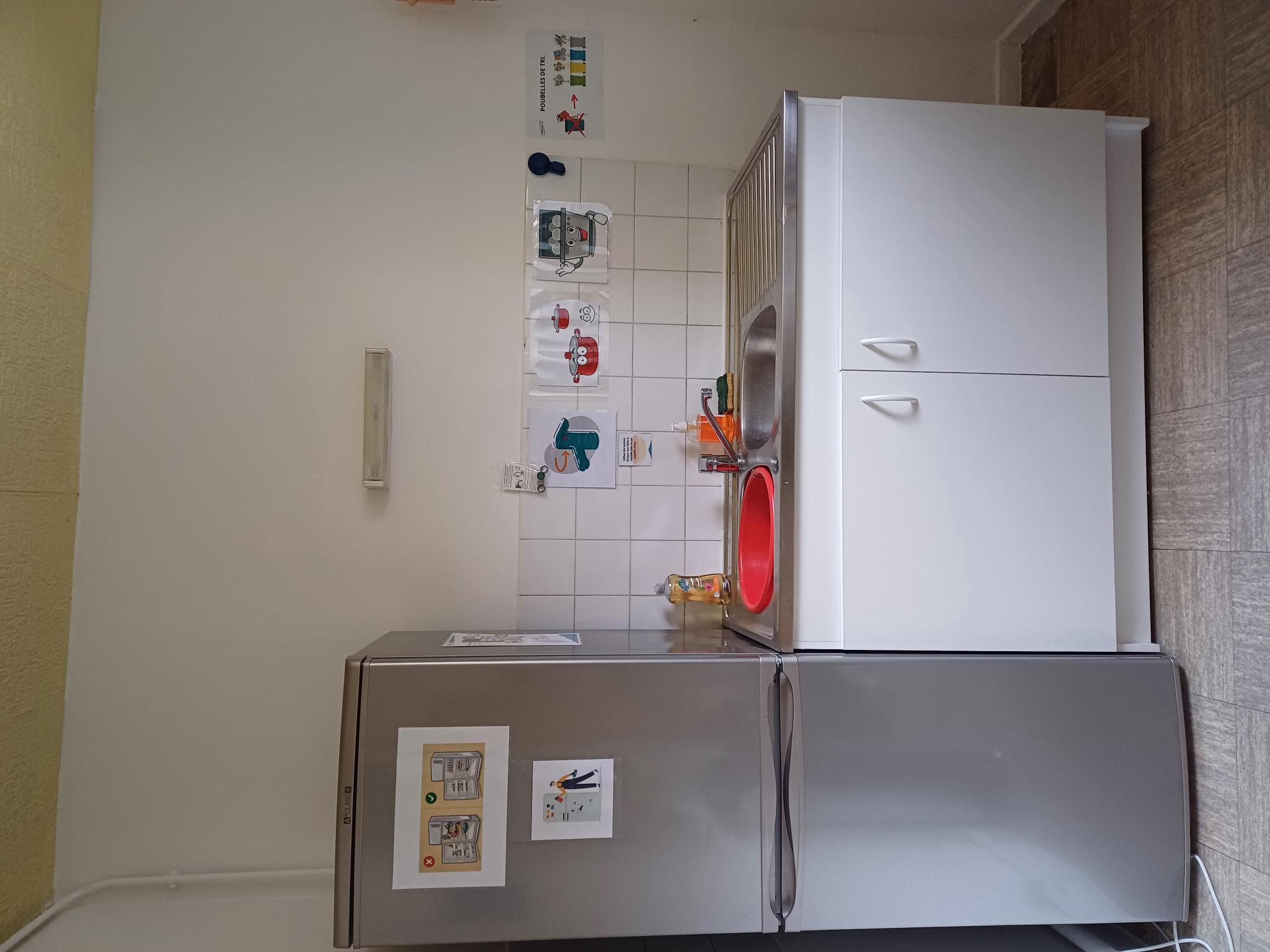Prioritising the places and people that need it the most
The Educational apartment
Smart Living Spaces: Empowering Tenants for a Sustainable and Energy-Efficient Future
The Educational apartment empowers tenants with practical skills to reduce energy consumption and improve home management. Through interactive workshops in fully equipped apartments, residents learn eco-friendly habits, energy-saving techniques, and DIY maintenance. This innovative initiative combats energy poverty, fosters sustainable living, and enhances tenant autonomy, making housing more inclusive and resilient
France
Regional
Provence-Alpes-Côte d'Azur (PACA), France
Mainly urban
It refers to other types of transformations (soft investment)
Yes
2024-12-31
No
No
Yes
Yes
Yes
As a representative of an organisation, in partnership with other organisations
The Educational Housing project embraces the New European Bauhaus (NEB) values of sustainability, inclusion, and aesthetics, while aligning with Corporate Social Responsibility (CSR) principles to promote energy sobriety, carbon footprint reduction, and tenant empowerment. By integrating education, energy efficiency, and community engagement, the project provides practical solutions to key social and environmental challenges in Vitrolles and Marseille.
Promoting NEB and CSR Core Values
Sustainability and Energy Sobriety:
Reduces energy consumption by teaching tenants eco-responsible behaviors in real-life housing.
Encourages energy-efficient appliances and water-saving techniques, lowering the carbon footprint.
Inclusion and Tenant Empowerment:
Ensures equal access to knowledge and resources for social housing tenants.
Free and accessible workshops, adapted to all literacy levels, make sustainability achievable.
Aesthetics & Quality of Life:
Transforms housing into learning spaces, where aesthetics meet functionality for impact.
CSR Commitment:
Engages housing providers, energy suppliers, and local groups in a collaborative effort.
Addressing Local Challenges
Energy Poverty: Many tenants face high energy bills. The project teaches practical ways to save.
Carbon Footprint Reduction: By optimizing energy use, the project helps lower urban emissions.
Social Cohesion and Tenant Autonomy: Community-led workshops foster collective responsibility.
Long-Term Impact
Lower energy costs and improved financial stability for tenants.
Empowered residents, who actively manage housing and adopt sustainable habits.
A replicable model for housing providers across Europe, reinforcing CSR and urban resilience.
By integrating NEB principles and CSR commitments, Educational Housing provides a sustainable, inclusive model to tackle energy poverty and reduce the carbon footprint in social housing.
Promoting NEB and CSR Core Values
Sustainability and Energy Sobriety:
Reduces energy consumption by teaching tenants eco-responsible behaviors in real-life housing.
Encourages energy-efficient appliances and water-saving techniques, lowering the carbon footprint.
Inclusion and Tenant Empowerment:
Ensures equal access to knowledge and resources for social housing tenants.
Free and accessible workshops, adapted to all literacy levels, make sustainability achievable.
Aesthetics & Quality of Life:
Transforms housing into learning spaces, where aesthetics meet functionality for impact.
CSR Commitment:
Engages housing providers, energy suppliers, and local groups in a collaborative effort.
Addressing Local Challenges
Energy Poverty: Many tenants face high energy bills. The project teaches practical ways to save.
Carbon Footprint Reduction: By optimizing energy use, the project helps lower urban emissions.
Social Cohesion and Tenant Autonomy: Community-led workshops foster collective responsibility.
Long-Term Impact
Lower energy costs and improved financial stability for tenants.
Empowered residents, who actively manage housing and adopt sustainable habits.
A replicable model for housing providers across Europe, reinforcing CSR and urban resilience.
By integrating NEB principles and CSR commitments, Educational Housing provides a sustainable, inclusive model to tackle energy poverty and reduce the carbon footprint in social housing.
Energy Sobriety
Tenant Empowerment
Sustainable Housing
Social Inclusion
Carbon Footprint Reduction
The Educational apartment project embodies the New European Bauhaus (NEB) values by integrating sustainability, inclusion, and aesthetics into social housing. It creates a practical, replicable model for energy efficiency, tenant empowerment, and affordable sustainable living.
Sustainability: Reducing Energy Use & Carbon Footprint
Encouraging Energy Sobriety: Tenants receive hands-on training to adopt eco-friendly habits, reducing energy and water consumption.
Long-Term Impact: The focus is on behavioral change, ensuring knowledge is transferable and applicable beyond training.
Waste Reduction & Circular Economy: Residents learn practical skills like waste sorting, minor home repairs, and sustainable product-making, promoting resource efficiency.
Inclusion: Accessible and Community-Centered Learning
Equal Access for Vulnerable Populations: The initiative is free and designed to be inclusive, benefiting low-income tenants, seniors, and people with low literacy.
Interactive and Immersive Approach: Learning takes place in fully equipped educational apartments, ensuring engagement through real-life experiences.
Multi-Stakeholder Collaboration: The project unites housing providers, associations, and energy suppliers, fostering tenant-led initiatives and peer learning.
Aesthetics & Quality of Life: Transforming Living Spaces
Enhancing Housing through Functionality: The apartments are not just training spaces but also welcoming environments, demonstrating how small improvements can increase comfort and sustainability.
Encouraging Tenant Pride and Engagement: By providing knowledge and tools, tenants take ownership of their living conditions, reinforcing a positive relationship with their home and community.
A Model for Replication & Scalability
The project’s holistic, cost-effective approach makes it easily adaptable to other social housing contexts, offering a sustainable, affordable, and inclusive solution for energy efficiency and tenant empowerment.
Sustainability: Reducing Energy Use & Carbon Footprint
Encouraging Energy Sobriety: Tenants receive hands-on training to adopt eco-friendly habits, reducing energy and water consumption.
Long-Term Impact: The focus is on behavioral change, ensuring knowledge is transferable and applicable beyond training.
Waste Reduction & Circular Economy: Residents learn practical skills like waste sorting, minor home repairs, and sustainable product-making, promoting resource efficiency.
Inclusion: Accessible and Community-Centered Learning
Equal Access for Vulnerable Populations: The initiative is free and designed to be inclusive, benefiting low-income tenants, seniors, and people with low literacy.
Interactive and Immersive Approach: Learning takes place in fully equipped educational apartments, ensuring engagement through real-life experiences.
Multi-Stakeholder Collaboration: The project unites housing providers, associations, and energy suppliers, fostering tenant-led initiatives and peer learning.
Aesthetics & Quality of Life: Transforming Living Spaces
Enhancing Housing through Functionality: The apartments are not just training spaces but also welcoming environments, demonstrating how small improvements can increase comfort and sustainability.
Encouraging Tenant Pride and Engagement: By providing knowledge and tools, tenants take ownership of their living conditions, reinforcing a positive relationship with their home and community.
A Model for Replication & Scalability
The project’s holistic, cost-effective approach makes it easily adaptable to other social housing contexts, offering a sustainable, affordable, and inclusive solution for energy efficiency and tenant empowerment.
The Educational apartment project improves living environments by integrating functional design, cultural engagement, and sustainability into social housing. It transforms apartments into immersive learning spaces, enhancing tenant experience, well-being, and connection to their homes.
Enhancing Aesthetics and Living Experience
Well-Designed Learning Spaces: Fully furnished apartments offer real-life settings where tenants practice sustainable home management.
Optimized Functionality: Spaces are arranged to demonstrate best practices in energy efficiency, ventilation, and home organization, making sustainability practical.
Visual and Sensory Learning: Infographics, interactive setups, and hands-on activities help tenants grasp key sustainability concepts.
Cultural and Social Engagement
Community-Centered Learning: The project fosters peer exchanges, where tenants share experiences, promoting collective learning and social bonds.
Workshops with Local Partners: Les Petits Débrouillards and Graine de Soleil provide practical workshops, connecting sustainability to cultural and everyday practices.
Tenant Empowerment: Training in home maintenance, energy management, and responsible consumption increases tenant autonomy and pride in their living spaces.
A Model for Replication and Inspiration
Transforming Housing into Learning Hubs: Apartments serve as functional educational spaces, where tenants develop long-term sustainable habits.
Scalable for Other Social Housing Projects: The initiative is easily replicable, providing a model for improving tenant engagement and living conditions.
Long-Term Impact: By combining design, sustainability, and cultural engagement, the project enhances tenant satisfaction and strengthens social cohesion.
By integrating aesthetics, culture, and sustainability, Educational Housing proves that beauty, inclusion, and sustainable living can coexist in affordable housing.
Enhancing Aesthetics and Living Experience
Well-Designed Learning Spaces: Fully furnished apartments offer real-life settings where tenants practice sustainable home management.
Optimized Functionality: Spaces are arranged to demonstrate best practices in energy efficiency, ventilation, and home organization, making sustainability practical.
Visual and Sensory Learning: Infographics, interactive setups, and hands-on activities help tenants grasp key sustainability concepts.
Cultural and Social Engagement
Community-Centered Learning: The project fosters peer exchanges, where tenants share experiences, promoting collective learning and social bonds.
Workshops with Local Partners: Les Petits Débrouillards and Graine de Soleil provide practical workshops, connecting sustainability to cultural and everyday practices.
Tenant Empowerment: Training in home maintenance, energy management, and responsible consumption increases tenant autonomy and pride in their living spaces.
A Model for Replication and Inspiration
Transforming Housing into Learning Hubs: Apartments serve as functional educational spaces, where tenants develop long-term sustainable habits.
Scalable for Other Social Housing Projects: The initiative is easily replicable, providing a model for improving tenant engagement and living conditions.
Long-Term Impact: By combining design, sustainability, and cultural engagement, the project enhances tenant satisfaction and strengthens social cohesion.
By integrating aesthetics, culture, and sustainability, Educational Housing proves that beauty, inclusion, and sustainable living can coexist in affordable housing.
The Educational apartment project ensures equal access to knowledge and sustainable housing solutions for social housing tenants. By focusing on affordability, accessibility, and tenant empowerment, it tackles energy poverty, financial challenges, and social cohesion.
Ensuring Accessibility and Affordability
Free and Practical Training: Workshops teach tenants how to reduce energy consumption, lower bills, and manage household expenses.
Adapted Learning Methods: Materials use visual aids, hands-on demonstrations, and simplified content to include low-literacy participants and elderly tenants.
Behavioral Change for Long-Term Impact: Rather than costly renovations, the project focuses on tenant habits, making sustainability accessible regardless of income.
Inclusive Learning Spaces and Community Engagement
Immersive Real-Life Environments: Fully furnished educational apartments allow tenants to apply sustainable practices directly in a home setting.
Collaborative Governance: Housing providers, local associations, and energy suppliers contribute to a tenant-centered approach.
Peer Learning and Social Bonds: Resident-led discussions and workshops foster knowledge exchange and strengthen community ties.
A Scalable and Replicable Model
Encouraging Tenant Autonomy: Training in home maintenance and energy management empowers residents to become more self-sufficient.
Strengthening Community Ties: Initiatives like "Cafés des habitants" provide spaces for dialogue and mutual support.
Easily Adaptable: The tenant-focused approach ensures the model can be replicated across different social housing contexts.
By integrating affordability, accessibility, and participation, Educational Housing offers a sustainable, inclusive, and scalable housing solution that helps reduce energy poverty and build resilient communities.
Ensuring Accessibility and Affordability
Free and Practical Training: Workshops teach tenants how to reduce energy consumption, lower bills, and manage household expenses.
Adapted Learning Methods: Materials use visual aids, hands-on demonstrations, and simplified content to include low-literacy participants and elderly tenants.
Behavioral Change for Long-Term Impact: Rather than costly renovations, the project focuses on tenant habits, making sustainability accessible regardless of income.
Inclusive Learning Spaces and Community Engagement
Immersive Real-Life Environments: Fully furnished educational apartments allow tenants to apply sustainable practices directly in a home setting.
Collaborative Governance: Housing providers, local associations, and energy suppliers contribute to a tenant-centered approach.
Peer Learning and Social Bonds: Resident-led discussions and workshops foster knowledge exchange and strengthen community ties.
A Scalable and Replicable Model
Encouraging Tenant Autonomy: Training in home maintenance and energy management empowers residents to become more self-sufficient.
Strengthening Community Ties: Initiatives like "Cafés des habitants" provide spaces for dialogue and mutual support.
Easily Adaptable: The tenant-focused approach ensures the model can be replicated across different social housing contexts.
By integrating affordability, accessibility, and participation, Educational Housing offers a sustainable, inclusive, and scalable housing solution that helps reduce energy poverty and build resilient communities.
The Educational apartment project is built on participation, collaboration, and real-life application, ensuring that citizens and civil society play an active role in shaping and implementing the initiative. This approach strengthens tenant empowerment, local partnerships, and sustainable housing solutions.
Citizen and Civil Society Involvement
Co-Design with Tenants: Residents contribute by sharing their needs, challenges, and feedback, ensuring the project meets real-life housing concerns.
Workshops and Peer Learning: Tenants participate in interactive training on energy efficiency, waste reduction, and home maintenance, fostering ownership and collective responsibility.
Community-Led Initiatives: Regular “Cafés des habitants” provide spaces for discussion and experience-sharing, strengthening social cohesion.
Collaboration with Civil Society and Local Organizations
Médiance 13: Leads tenant support and facilitates training sessions tailored to housing challenges.
Les Petits Débrouillards: Hosts DIY and maintenance workshops, helping tenants become more autonomous in managing their homes.
Graine de Soleil: Conducts eco-friendly lifestyle workshops, promoting sustainable habits.
Housing Providers and Energy Suppliers: Offer expertise, tools, and financial support to make sustainability accessible.
Impact of Citizen and Civil Society Involvement
Increased Tenant Engagement: Residents take an active role in learning and sharing best practices, making sustainability a long-term, community-driven effort.
Stronger Social Bonds: Peer-to-peer exchanges reinforce trust and collaboration within neighborhoods.
Scalable and Replicable Model: The participatory approach ensures adaptability across different housing communities, fostering resilient and inclusive social housing.
By integrating citizen-driven participation and multi-stakeholder collaboration, Educational Housing sets an example for inclusive, sustainable, and human-centered housing solutions.
Citizen and Civil Society Involvement
Co-Design with Tenants: Residents contribute by sharing their needs, challenges, and feedback, ensuring the project meets real-life housing concerns.
Workshops and Peer Learning: Tenants participate in interactive training on energy efficiency, waste reduction, and home maintenance, fostering ownership and collective responsibility.
Community-Led Initiatives: Regular “Cafés des habitants” provide spaces for discussion and experience-sharing, strengthening social cohesion.
Collaboration with Civil Society and Local Organizations
Médiance 13: Leads tenant support and facilitates training sessions tailored to housing challenges.
Les Petits Débrouillards: Hosts DIY and maintenance workshops, helping tenants become more autonomous in managing their homes.
Graine de Soleil: Conducts eco-friendly lifestyle workshops, promoting sustainable habits.
Housing Providers and Energy Suppliers: Offer expertise, tools, and financial support to make sustainability accessible.
Impact of Citizen and Civil Society Involvement
Increased Tenant Engagement: Residents take an active role in learning and sharing best practices, making sustainability a long-term, community-driven effort.
Stronger Social Bonds: Peer-to-peer exchanges reinforce trust and collaboration within neighborhoods.
Scalable and Replicable Model: The participatory approach ensures adaptability across different housing communities, fostering resilient and inclusive social housing.
By integrating citizen-driven participation and multi-stakeholder collaboration, Educational Housing sets an example for inclusive, sustainable, and human-centered housing solutions.
The Educational apartment project involves multi-level collaboration, ensuring local, regional, national, and European stakeholders contribute to its design, implementation, and impact. This cross-sector approach enhances sustainability, replicability, and social inclusion.
Local Level: Direct Implementation and Tenant Engagement
Médiance 13: Manages educational apartments, leads energy efficiency, home maintenance, and tenant empowerment workshops.
Les Petits Débrouillards & Graine de Soleil: Offer DIY workshops and eco-friendly household training, linking sustainability to daily life.
Tenant Associations & Residents: Participate in co-design sessions and peer-learning activities, ensuring the project meets community needs.
City Authorities (Vitrolles & Marseille): Promote tenant engagement and provide logistical support.
Regional and National Level: Institutional and Financial Support
Housing Providers (1001 Vies Habitat & Three Other Landlords): Fund and expand the project across multiple social housing sites.
Energy Suppliers (EDF, ENGIE, Enedis, SEMM): Provide expertise, tools, and financial aid to help tenants reduce energy bills and carbon footprint.
Social & Environmental Organizations: Offer technical assistance to enhance social inclusion and sustainability strategies.
European Level: Knowledge Sharing and Replicability
EU Networks & Housing Forums: Share best practices, supporting adaptation and expansion of the model across Europe.
Added Value of Multi-Level Engagement
Stronger Local Impact: Tenant involvement ensures solutions address real needs.
Scalability & Policy Influence: National and EU-level collaboration supports replication in social housing policies.
Sustainability & Efficiency: Energy provider expertise reduces long-term costs and environmental impact.
By integrating stakeholders at every level, Educational Housing provides a scalable, community-driven, and sustainable model adaptable across Europe.
Local Level: Direct Implementation and Tenant Engagement
Médiance 13: Manages educational apartments, leads energy efficiency, home maintenance, and tenant empowerment workshops.
Les Petits Débrouillards & Graine de Soleil: Offer DIY workshops and eco-friendly household training, linking sustainability to daily life.
Tenant Associations & Residents: Participate in co-design sessions and peer-learning activities, ensuring the project meets community needs.
City Authorities (Vitrolles & Marseille): Promote tenant engagement and provide logistical support.
Regional and National Level: Institutional and Financial Support
Housing Providers (1001 Vies Habitat & Three Other Landlords): Fund and expand the project across multiple social housing sites.
Energy Suppliers (EDF, ENGIE, Enedis, SEMM): Provide expertise, tools, and financial aid to help tenants reduce energy bills and carbon footprint.
Social & Environmental Organizations: Offer technical assistance to enhance social inclusion and sustainability strategies.
European Level: Knowledge Sharing and Replicability
EU Networks & Housing Forums: Share best practices, supporting adaptation and expansion of the model across Europe.
Added Value of Multi-Level Engagement
Stronger Local Impact: Tenant involvement ensures solutions address real needs.
Scalability & Policy Influence: National and EU-level collaboration supports replication in social housing policies.
Sustainability & Efficiency: Energy provider expertise reduces long-term costs and environmental impact.
By integrating stakeholders at every level, Educational Housing provides a scalable, community-driven, and sustainable model adaptable across Europe.
The Educational apartment project integrates multiple disciplines and knowledge fields, ensuring a comprehensive approach to energy efficiency, tenant empowerment, and sustainable housing. The collaboration between experts in social work, environmental science, housing management, and education strengthens tenant engagement and long-term impact.
Key Disciplines and Knowledge Fields
Social Work & Community Engagement: Médiance 13 provides tenant support, mediation, and personalized guidance, ensuring accessibility for all residents.
Environmental Science & Energy Efficiency: Energy suppliers (EDF, ENGIE, Enedis, SEMM) contribute expertise in energy-saving practices, carbon footprint reduction, and resource management.
Education & Behavioral Change: Les Petits Débrouillards and Graine de Soleil design interactive learning experiences, helping tenants adopt sustainable daily habits.
Architecture & Housing Management: Housing providers (1001 Vies Habitat and three other landlords) integrate functional design and space optimization, demonstrating practical home improvements.
Interdisciplinary Interaction and Collaboration
Co-Design Process: Housing experts, social workers, and educators jointly develop tailored workshops and training programs.
Tenant-Centered Learning: Knowledge is shared through hands-on demonstrations, peer learning, and interactive activities.
Cross-Sectoral Engagement: Public institutions, energy providers, and community groups work together to enhance accessibility, affordability, and sustainability.
Added Value of Interdisciplinary Collaboration
Holistic Approach: The integration of technical, social, and environmental expertise makes the project comprehensive and impactful.
Scalable and Adaptable: The interdisciplinary method ensures replicability across different housing contexts.
Stronger Tenant Engagement: Combining expertise improves learning retention and long-term behavior change.
Key Disciplines and Knowledge Fields
Social Work & Community Engagement: Médiance 13 provides tenant support, mediation, and personalized guidance, ensuring accessibility for all residents.
Environmental Science & Energy Efficiency: Energy suppliers (EDF, ENGIE, Enedis, SEMM) contribute expertise in energy-saving practices, carbon footprint reduction, and resource management.
Education & Behavioral Change: Les Petits Débrouillards and Graine de Soleil design interactive learning experiences, helping tenants adopt sustainable daily habits.
Architecture & Housing Management: Housing providers (1001 Vies Habitat and three other landlords) integrate functional design and space optimization, demonstrating practical home improvements.
Interdisciplinary Interaction and Collaboration
Co-Design Process: Housing experts, social workers, and educators jointly develop tailored workshops and training programs.
Tenant-Centered Learning: Knowledge is shared through hands-on demonstrations, peer learning, and interactive activities.
Cross-Sectoral Engagement: Public institutions, energy providers, and community groups work together to enhance accessibility, affordability, and sustainability.
Added Value of Interdisciplinary Collaboration
Holistic Approach: The integration of technical, social, and environmental expertise makes the project comprehensive and impactful.
Scalable and Adaptable: The interdisciplinary method ensures replicability across different housing contexts.
Stronger Tenant Engagement: Combining expertise improves learning retention and long-term behavior change.
The Educational apartment project introduces a transformative approach to tenant engagement, sustainability, and housing management, moving beyond conventional social housing initiatives. Unlike mainstream actions that focus primarily on infrastructure upgrades and financial assistance, this project empowers tenants through hands-on learning, behavioral change, and community-driven solutions.
Key Innovations
Real-Life Learning Environments: Instead of theoretical training, tenants engage in interactive workshops inside fully furnished apartments, where they can practice energy-saving techniques, home maintenance, and sustainable living in a familiar setting.
Holistic Tenant Empowerment: Traditional housing programs focus on financial aid or technical upgrades, whereas this initiative gives tenants practical skills to manage their energy use, household maintenance, and waste reduction, ensuring long-term impact.
Community-Centered Approach: Rather than top-down interventions, the project relies on peer-to-peer learning, tenant-led activities, and collaboration with local organizations, fostering shared responsibility and stronger social ties.
Cross-Sector Collaboration: In contrast to siloed housing initiatives, this project brings together housing providers, social organizations, and energy suppliers to create a comprehensive, tenant-focused strategy.
Impact Beyond Mainstream Practices
Sustainable Behavior Change: Mainstream programs often rely on temporary financial aid, while this project ensures long-lasting savings through behavioral shifts.
Scalability and Adaptability: The model is low-cost and easily replicable, making it adaptable to various social housing contexts across Europe.
Social and Environmental Benefits: By integrating education, sustainability, and inclusion, the project creates self-sufficient tenants and resilient communities, setting a new standard for social housing management.
Key Innovations
Real-Life Learning Environments: Instead of theoretical training, tenants engage in interactive workshops inside fully furnished apartments, where they can practice energy-saving techniques, home maintenance, and sustainable living in a familiar setting.
Holistic Tenant Empowerment: Traditional housing programs focus on financial aid or technical upgrades, whereas this initiative gives tenants practical skills to manage their energy use, household maintenance, and waste reduction, ensuring long-term impact.
Community-Centered Approach: Rather than top-down interventions, the project relies on peer-to-peer learning, tenant-led activities, and collaboration with local organizations, fostering shared responsibility and stronger social ties.
Cross-Sector Collaboration: In contrast to siloed housing initiatives, this project brings together housing providers, social organizations, and energy suppliers to create a comprehensive, tenant-focused strategy.
Impact Beyond Mainstream Practices
Sustainable Behavior Change: Mainstream programs often rely on temporary financial aid, while this project ensures long-lasting savings through behavioral shifts.
Scalability and Adaptability: The model is low-cost and easily replicable, making it adaptable to various social housing contexts across Europe.
Social and Environmental Benefits: By integrating education, sustainability, and inclusion, the project creates self-sufficient tenants and resilient communities, setting a new standard for social housing management.
The Educational apartment project is based on a practical, tenant-centered approach that integrates education, sustainability, and social inclusion into social housing. Rather than relying on top-down interventions, the project empowers residents through hands-on training, behavioral change, and community engagement.
Key Methodological Principles
Experiential Learning: The project provides real-life training in fully equipped educational apartments, allowing tenants to practice energy-saving techniques, home maintenance, and sustainable habits in a familiar environment.
Behavioral Change Model: Unlike traditional housing programs focused on infrastructure improvements, this approach teaches long-term sustainable behaviors, ensuring tenants can maintain energy-efficient habits even if they move.
Peer-to-Peer Learning & Community Involvement: Tenants participate in interactive workshops and knowledge-sharing sessions, fostering collective responsibility and stronger social bonds.
Implementation Steps
Tenant Assessment: Identifying housing challenges and training needs through surveys and consultations.
Educational Workshops: Covering energy efficiency, waste reduction, home repairs, and eco-friendly habits, supported by local partners.
Practical Application: Tenants implement learned techniques in their own homes, ensuring real-world impact.
Ongoing Support & Feedback: Monitoring behavioral shifts, tracking energy savings, and adapting workshops based on tenant needs.
Scalability & Adaptability
The methodology is low-cost, replicable, and adaptable across various social housing settings. By focusing on behavioral change, tenant empowerment, and local partnerships, the project creates long-lasting social and environmental impact, setting a new standard for sustainable housing initiatives.
Key Methodological Principles
Experiential Learning: The project provides real-life training in fully equipped educational apartments, allowing tenants to practice energy-saving techniques, home maintenance, and sustainable habits in a familiar environment.
Behavioral Change Model: Unlike traditional housing programs focused on infrastructure improvements, this approach teaches long-term sustainable behaviors, ensuring tenants can maintain energy-efficient habits even if they move.
Peer-to-Peer Learning & Community Involvement: Tenants participate in interactive workshops and knowledge-sharing sessions, fostering collective responsibility and stronger social bonds.
Implementation Steps
Tenant Assessment: Identifying housing challenges and training needs through surveys and consultations.
Educational Workshops: Covering energy efficiency, waste reduction, home repairs, and eco-friendly habits, supported by local partners.
Practical Application: Tenants implement learned techniques in their own homes, ensuring real-world impact.
Ongoing Support & Feedback: Monitoring behavioral shifts, tracking energy savings, and adapting workshops based on tenant needs.
Scalability & Adaptability
The methodology is low-cost, replicable, and adaptable across various social housing settings. By focusing on behavioral change, tenant empowerment, and local partnerships, the project creates long-lasting social and environmental impact, setting a new standard for sustainable housing initiatives.
The Educational apartment project is designed to be easily transferable and replicable across different social housing contexts, benefiting various tenant groups. Its low-cost, behavior-focused approach ensures long-term impact without requiring major infrastructure investments, making it adaptable to different regions, housing models, and community needs.
Key Replicable Elements
Methodology & Learning Model: The hands-on training approach in fully furnished educational apartments can be replicated in any social housing setting, allowing tenants to learn energy-saving techniques, home maintenance, and sustainable behaviors.
Behavioral Change Strategies: Unlike infrastructure-dependent solutions, this project focuses on tenant education and empowerment, making it cost-effective and adaptable to various populations.
Peer Learning & Community Engagement: The collaborative model, including workshops, tenant-led initiatives, and partnerships with local organizations, can be scaled and adapted to different cultural and social contexts.
Cross-Sector Partnerships: The involvement of housing providers, local authorities, energy suppliers, and community groups ensures the model is financially and logistically viable anywhere.
Scalability Across Different Contexts
Geographical Adaptability: The model can be implemented in urban and rural areas, supporting energy-poor households across Europe.
Target Group Expansion: The approach is relevant to low-income families, elderly tenants, migrants, and vulnerable populations, making it widely applicable.
Policy Integration: The initiative aligns with EU Green Deal objectives and could be integrated into social housing policies, strengthening its long-term impact.
By focusing on education, empowerment, and sustainability, the project offers a scalable, adaptable, and cost-effective solution for housing providers and municipalities across Europe.
Key Replicable Elements
Methodology & Learning Model: The hands-on training approach in fully furnished educational apartments can be replicated in any social housing setting, allowing tenants to learn energy-saving techniques, home maintenance, and sustainable behaviors.
Behavioral Change Strategies: Unlike infrastructure-dependent solutions, this project focuses on tenant education and empowerment, making it cost-effective and adaptable to various populations.
Peer Learning & Community Engagement: The collaborative model, including workshops, tenant-led initiatives, and partnerships with local organizations, can be scaled and adapted to different cultural and social contexts.
Cross-Sector Partnerships: The involvement of housing providers, local authorities, energy suppliers, and community groups ensures the model is financially and logistically viable anywhere.
Scalability Across Different Contexts
Geographical Adaptability: The model can be implemented in urban and rural areas, supporting energy-poor households across Europe.
Target Group Expansion: The approach is relevant to low-income families, elderly tenants, migrants, and vulnerable populations, making it widely applicable.
Policy Integration: The initiative aligns with EU Green Deal objectives and could be integrated into social housing policies, strengthening its long-term impact.
By focusing on education, empowerment, and sustainability, the project offers a scalable, adaptable, and cost-effective solution for housing providers and municipalities across Europe.
The Educational apartment project tackles global challenges such as climate change, energy poverty, and social inequality by implementing local, tenant-driven solutions in social housing. By focusing on education, behavioral change, and sustainability, the project creates resilient communities while contributing to broader global objectives.
Key Global Challenges Addressed
Climate Change & Carbon Footprint Reduction:
The project helps reduce household energy consumption by teaching tenants eco-friendly habits, such as efficient use of electricity, water conservation, and waste reduction.
It aligns with EU Green Deal objectives by promoting energy sobriety and carbon footprint reduction in social housing.
Energy Poverty & Rising Living Costs:
Many low-income households struggle with high energy bills due to poor resource management.
The project educates tenants on energy-saving techniques, helping them lower expenses and improve financial stability.
Social Inequality & Housing Exclusion:
Vulnerable populations often lack access to knowledge and tools to maintain sustainable homes.
Through free workshops, peer learning, and local partnerships, the project ensures accessibility and inclusion.
Local Solutions with Global Impact
Scalable, Low-Cost Model: The educational approach is easily replicable in different housing contexts, making it a cost-effective alternative to infrastructure-heavy interventions.
Community-Led Change: By engaging tenants, local associations, and housing providers, the initiative strengthens social cohesion and long-term sustainability.
Policy Influence & Urban Resilience: The model can inspire housing policies that integrate tenant education into sustainability efforts, promoting resilient cities worldwide.
By combining local action with global impact, Educational Housing provides practical, scalable solutions to some of the most pressing sustainability and social challenges.
Key Global Challenges Addressed
Climate Change & Carbon Footprint Reduction:
The project helps reduce household energy consumption by teaching tenants eco-friendly habits, such as efficient use of electricity, water conservation, and waste reduction.
It aligns with EU Green Deal objectives by promoting energy sobriety and carbon footprint reduction in social housing.
Energy Poverty & Rising Living Costs:
Many low-income households struggle with high energy bills due to poor resource management.
The project educates tenants on energy-saving techniques, helping them lower expenses and improve financial stability.
Social Inequality & Housing Exclusion:
Vulnerable populations often lack access to knowledge and tools to maintain sustainable homes.
Through free workshops, peer learning, and local partnerships, the project ensures accessibility and inclusion.
Local Solutions with Global Impact
Scalable, Low-Cost Model: The educational approach is easily replicable in different housing contexts, making it a cost-effective alternative to infrastructure-heavy interventions.
Community-Led Change: By engaging tenants, local associations, and housing providers, the initiative strengthens social cohesion and long-term sustainability.
Policy Influence & Urban Resilience: The model can inspire housing policies that integrate tenant education into sustainability efforts, promoting resilient cities worldwide.
By combining local action with global impact, Educational Housing provides practical, scalable solutions to some of the most pressing sustainability and social challenges.
The Educational apartment project has generated tangible results and long-term impact by improving tenant empowerment, energy efficiency, and social cohesion in social housing. Through practical education and behavioral change, the initiative has delivered measurable benefits for both direct and indirect beneficiaries.
Key Achievements & Outputs
More than 600 tenants engaged in interactive workshops and peer learning sessions.
Household energy consumption reduced, leading to lower utility bills and improved financial stability for participating tenants.
Distribution of energy-saving tools, such as LED bulbs, water-saving kits, and thermal insulation solutions, enhancing daily sustainability practices.
Increased tenant autonomy, with residents applying home maintenance, ventilation management, and energy-efficient behaviors in their living spaces.
Impact on Direct Beneficiaries
Tenants gain practical skills to manage their homes more sustainably, reducing dependency on external support.
Vulnerable groups (low-income families, elderly, and single-parent households) experience improved housing conditions, affordability, and social integration.
Stronger community engagement through collaborative workshops and tenant-led initiatives, fostering local solidarity and empowerment.
Wider Impact on Housing and Sustainability
Housing providers benefit from lower maintenance costs as tenants proactively manage their energy use and household upkeep.
Cities and municipalities see improved social cohesion and energy efficiency in social housing neighborhoods.
Scalable and replicable model, supporting EU sustainability goals and reducing the carbon footprint of residential areas.
By focusing on tenant-driven solutions and behavioral change, Educational Housing demonstrates a sustainable, inclusive, and high-impact model for affordable and resilient housing.
Key Achievements & Outputs
More than 600 tenants engaged in interactive workshops and peer learning sessions.
Household energy consumption reduced, leading to lower utility bills and improved financial stability for participating tenants.
Distribution of energy-saving tools, such as LED bulbs, water-saving kits, and thermal insulation solutions, enhancing daily sustainability practices.
Increased tenant autonomy, with residents applying home maintenance, ventilation management, and energy-efficient behaviors in their living spaces.
Impact on Direct Beneficiaries
Tenants gain practical skills to manage their homes more sustainably, reducing dependency on external support.
Vulnerable groups (low-income families, elderly, and single-parent households) experience improved housing conditions, affordability, and social integration.
Stronger community engagement through collaborative workshops and tenant-led initiatives, fostering local solidarity and empowerment.
Wider Impact on Housing and Sustainability
Housing providers benefit from lower maintenance costs as tenants proactively manage their energy use and household upkeep.
Cities and municipalities see improved social cohesion and energy efficiency in social housing neighborhoods.
Scalable and replicable model, supporting EU sustainability goals and reducing the carbon footprint of residential areas.
By focusing on tenant-driven solutions and behavioral change, Educational Housing demonstrates a sustainable, inclusive, and high-impact model for affordable and resilient housing.

